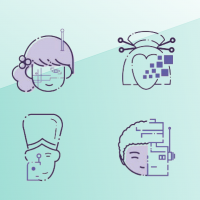Building Culturally Inclusive AI Models

We know that AI algorithms and data sets are limited in understanding different cultural contexts, inhibiting the effectiveness of businesses expanding into new markets. How do you bring businesses closer to the audiences they’re targeting? I would argue that cultural intelligence is the missing key.
As children, we learn our history through the stories our family and friends tell us about our community and where we come from. We can take the same approach to teach machines about our heritage, our communities, and our myths and legends. We understand the complex nature of the problem, so we believe that deep collaboration, diversity, and transparency will lead to best outcomes.
We have a role in designing this new future. AI must understand cultural context and be able to respond to it effectively. If we have the ingenuity to make self-driving cars, we can and must make the interactions between humans and machines more empathetic and inclusive.
AI-powered cultural analytics should empower decision-makers. Working collaboratively, we can build the foundations for cultural IQ in machines.
At the Test Master Academy in New York this June, I met Aprajita Mathur, a leading bioinformatics software test engineer. After I presented on cultural IQ in AI, we talked about how crucial culturally relevant data sets are in the medical sciences. “Each human is not just figuratively but also literally unique,” Mathur said. “‘One-size-fits-all’ approaches and treatments may be very successful for some patients, but not for others.”
The concept of personalization is as important in AI as it is in medicine. Building Al systems with cultural content is akin to starting the Precision Medicine Initiative, Mathur said.
“Someday my great-great-granddaughter will ask, ‘Google, why do Indians wear a red dot on their foreheads?’” she said. “I want the answer to be truly reflective of her ancestry and include the emotions that I would feel in answering that question, rather than the one-size-fits-all answer that it’s common practice to do so."
For us to build the most effective technology, we need to learn from our past and build our future with more comprehensive data sets with cultural IQ. This means AI that can recognize you and your story, chatbots that speak to you more deeply and authentically, and smart assistants that come from a place of wisdom about your ancestry.
The concept of personalization in technology has been front and center for years. Now we just need to add cultural intelligence:
- Use AI to search for, identify, classify, and promote all possible cultures from the past, present, and future
- Maintain a real-time culture graph based on changing external data points and human input
- Make cultural intelligence easily available to both human and machine audiences
Building culturally inclusive models is vital. To do that, we need a coalition of global experts in data, AI, cultural anthropology, ethics, and engineering. Collecting culturally prominent data sets in an efficient and scalable manner today is paramount to future commercial success.
Davar Ardalan is presenting the keynote Storytelling in the Age of AI at STARWEST 2019, September 29–October 4 in Anaheim, California.

